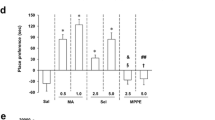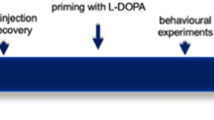Abstract
1-Methyl-4-phenyl-1,2,5,6-tetrahydropyridine (MPTP) causes degeneration of the dopaminergic nigrostriatal pathway in several animal species, including humans1,2, monkeys3,4 and mice5–7. Changes observed after MPTP administration include marked decrements in the neostriatal content of dopamine and its major metabolites, dihydroxyphenylacetic acid and homovanillic acid, and a greatly diminished capacity of neostriatal synaptosomes to take up 3H-dopamine5,6. In contrast, there is no pronounced loss of serotonin in the neostriatum or of dopamine and its metabolites in other brain areas in MPTP-treated animals. The oxidative metabolism of MPTP to 1-methyl-4-phenyl pyridine, a positively charged species, has been suggested as a critical feature in the neurotoxic process8. Moreover, in rat brain preparations, the monoamine oxidase (MAO) inhibitor pargyline and the specific MAO-B inhibitor deprenil can prevent the formation of 1-methyl-4-phenyl-pyridine from MPTP, while the specific MAO-A inhibitor clorgyline has no such effect9, suggesting that MAO, and specifically MAO-B, is responsible for the oxidative metabolism of MPTP. We now report that pargyline, nialamide and tranylcypromine, which inhibit both MAO-A and MAO-B, when administered to mice before MPTP, protect against MPTP-induced dopaminergic neurotoxicity. Deprenil is also protective, but clorgyline is not. Our data are consistent with the premise that MAO-B has a crucial role in MPTP-induced degeneration of the nigrostriatal dopaminergic neuronal pathway.
Similar content being viewed by others
References
Davis, G. C. et al. Psychol. Res. 1, 249–254 (1979).
Langston, J. W., Ballard, P., Tetrud, J. W. & Irwin, I. Science 219, 979–980 (1983).
Burns, R. S. et al. Proc. natn. Acad. Sci. U.S.A. 80, 4546–4550 (1983).
Langston, J. W., Forno, L. S., Rebert, C. S. & Irwin, I. Brain Res. 292, 390–394 (1984).
Heikkila, R. E., Cabbat, F. S., Manzino, L. & Duvoisin, R. C. Fedn Proc. 43, 743 (1984).
Heikkila, R. E., Hess, A. & Duvoisin, R. C. Science 224, 1451 (1984).
Hallman, H., Olson, L. & Jonsson, G. Eur. J. Pharmac. 97, 133–136 (1984).
Markey, S. P., Johannessen, J. N., Chiueh, C. C., Burns, R. S. & Herkenham, M. A. American College of Neuropsychopharmacology Meeting, Abstr., 69 (1983).
Chiba, K., Trevor, A. & Castagnoli, N. Biochem. biophys. Res. Commun. 120, 574–578 (1984).
Neff, N. H. & Goridis, C. Adv. Biochem. Psychopharmac. 5, 307–323 (1972).
Mayer, G. S. & Shoup, R. E. J. Chromatogr. 255, 533–544 (1983).
Gershanik, O., Heikkila, R. E. & Duvoisin, R. C. Brain Res. 261, 358–360 (1983).
Author information
Authors and Affiliations
Rights and permissions
About this article
Cite this article
Heikkila, R., Manzino, L., Cabbat, F. et al. Protection against the dopaminergic neurotoxicity of 1-methyl-4-phenyl-1,2,5,6-tetrahydropyridine by monoamine oxidase inhibitors. Nature 311, 467–469 (1984). https://doi.org/10.1038/311467a0
Received:
Accepted:
Issue Date:
DOI: https://doi.org/10.1038/311467a0
- Springer Nature Limited
This article is cited by
-
Bi-directional regulation of AIMP2 and its splice variant on PARP-1-dependent neuronal cell death; Therapeutic implication for Parkinson's disease
Acta Neuropathologica Communications (2024)
-
Rasagiline and selegiline modulate mitochondrial homeostasis, intervene apoptosis system and mitigate α-synuclein cytotoxicity in disease-modifying therapy for Parkinson’s disease
Journal of Neural Transmission (2020)
-
Neuroprotection in Parkinson’s disease: facts and hopes
Journal of Neural Transmission (2020)
-
Glutamine protects against oxidative stress injury through inhibiting the activation of PI3K/Akt signaling pathway in parkinsonian cell model
Environmental Health and Preventive Medicine (2019)
-
Type A and B monoamine oxidases distinctly modulate signal transduction pathway and gene expression to regulate brain function and survival of neurons
Journal of Neural Transmission (2018)





